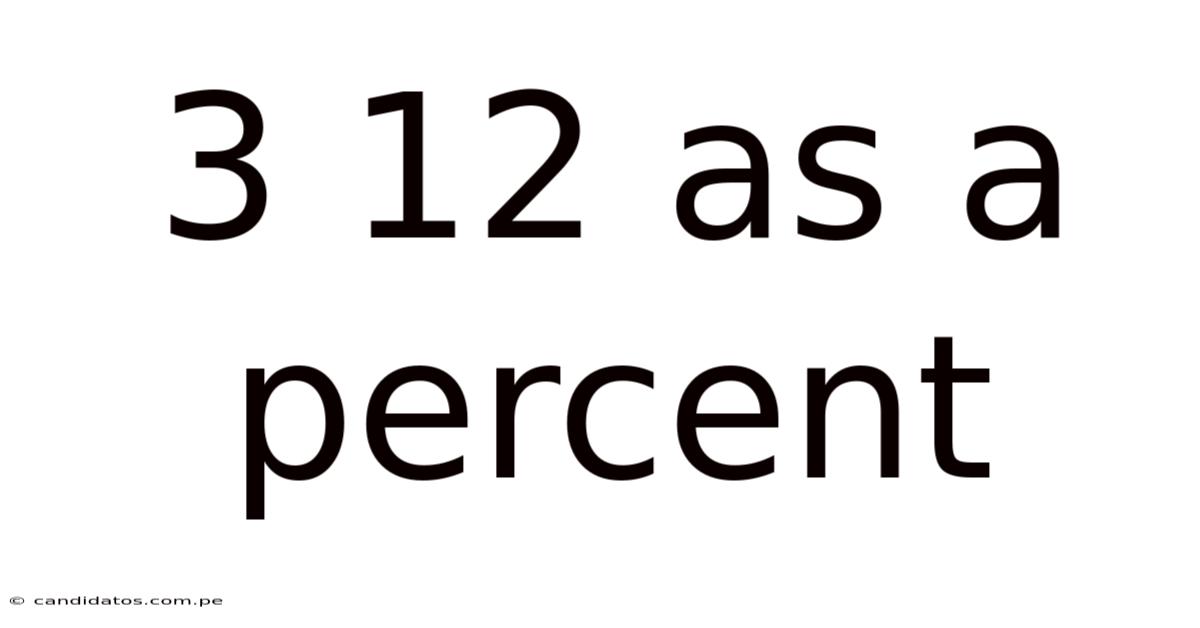3 12 As A Percent
candidatos
Sep 20, 2025 · 4 min read

Table of Contents
Understanding 3/12 as a Percentage: A Comprehensive Guide
Converting fractions to percentages is a fundamental skill in mathematics with applications spanning various fields, from finance and statistics to everyday budgeting and cooking. This comprehensive guide will delve into the process of converting the fraction 3/12 into a percentage, explaining the underlying concepts and providing practical examples. We'll explore different methods, address common misconceptions, and answer frequently asked questions to ensure a thorough understanding. By the end, you’ll not only know the answer but also possess the tools to confidently tackle similar fraction-to-percentage conversions.
Understanding Fractions and Percentages
Before diving into the conversion, let's refresh our understanding of fractions and percentages. A fraction represents a part of a whole. In the fraction 3/12, '3' is the numerator (the part) and '12' is the denominator (the whole). A percentage, denoted by the symbol '%', represents a fraction of 100. Therefore, converting a fraction to a percentage means expressing that fraction as a number out of 100.
Method 1: Simplifying the Fraction
The simplest and often most efficient method begins by simplifying the fraction 3/12. Both the numerator and the denominator share a common factor of 3. Dividing both by 3, we get:
3 ÷ 3 / 12 ÷ 3 = 1/4
This simplified fraction, 1/4, is equivalent to 3/12. Now, we can easily convert this simplified fraction to a percentage.
Method 2: Direct Conversion
Alternatively, we can directly convert 3/12 to a percentage without simplifying first. To do this, we divide the numerator (3) by the denominator (12) and then multiply the result by 100%.
3 ÷ 12 = 0.25
0.25 x 100% = 25%
Therefore, 3/12 is equal to 25%.
Method 3: Using Proportions
This method uses the concept of proportions to solve for the percentage. We set up a proportion where x represents the percentage we are trying to find:
3/12 = x/100
To solve for x, we cross-multiply:
12x = 300
Then, we divide both sides by 12:
x = 300 ÷ 12 = 25
Therefore, x = 25%, confirming that 3/12 is equal to 25%.
Illustrative Examples: Real-World Applications
Let's consider a few real-world examples to solidify our understanding:
-
Sales Discounts: A store offers a discount of 3/12 on all items. This means customers receive a 25% discount.
-
Survey Results: In a survey of 12 people, 3 preferred a particular brand of coffee. This represents 25% preference for that brand.
-
Project Completion: If a project is divided into 12 tasks, and 3 tasks are completed, then 25% of the project is finished.
These examples showcase the practical applications of converting fractions like 3/12 to percentages, highlighting the importance of this skill in various contexts.
Further Exploration: Decimals and Percentages
It's important to note the relationship between decimals, fractions, and percentages. The decimal equivalent of 3/12 (or 1/4) is 0.25. This decimal can be easily converted to a percentage by multiplying by 100%, resulting in 25%. Understanding this interconnectedness helps to navigate conversions effortlessly.
Addressing Common Misconceptions
A common misconception is assuming that simply multiplying the numerator by 100% will give the correct percentage. This is incorrect. The crucial step is dividing the numerator by the denominator before multiplying by 100%.
Frequently Asked Questions (FAQ)
-
Q: Can I convert any fraction to a percentage?
- A: Yes, any fraction can be converted to a percentage by dividing the numerator by the denominator and then multiplying by 100%.
-
Q: What if the resulting decimal has many digits after the decimal point?
- A: You can round the decimal to a desired number of decimal places (e.g., two decimal places for common usage).
-
Q: Is it always necessary to simplify the fraction before converting to a percentage?
- A: No, while simplifying makes the calculation easier, it's not mandatory. Both methods (simplifying and direct conversion) yield the same result.
-
Q: What if the denominator of the fraction is zero?
- A: A fraction with a denominator of zero is undefined, and therefore cannot be converted to a percentage.
Conclusion: Mastering Fraction-to-Percentage Conversion
Converting 3/12 to a percentage, which equals 25%, is a straightforward process. We explored three different methods – simplifying the fraction, direct conversion, and using proportions – to achieve the same result. Understanding these methods allows you to apply the concept to various fractions, strengthening your mathematical skills and facilitating practical problem-solving in numerous fields. Remember the key steps: divide the numerator by the denominator, and then multiply by 100% to obtain the percentage equivalent. By understanding the underlying principles and practicing these methods, you'll gain confidence and proficiency in tackling similar conversions. This skill proves invaluable not only in academic settings but also in everyday life. Mastering it opens doors to more complex mathematical concepts and their real-world applications.
Latest Posts
Latest Posts
-
Picture Frame 42cm X 30cm
Sep 20, 2025
-
Number Of Protons In Iron
Sep 20, 2025
-
Complete Crossword Clue 8 Letters
Sep 20, 2025
-
Nice Words Beginning With F
Sep 20, 2025
-
Simple Interest Or Compound Interest
Sep 20, 2025
Related Post
Thank you for visiting our website which covers about 3 12 As A Percent . We hope the information provided has been useful to you. Feel free to contact us if you have any questions or need further assistance. See you next time and don't miss to bookmark.